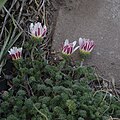Anacyclus pyrethrum
| Anacyclus pyrethrum | |
|---|---|

| |
| Mount Atlas daisy | |
| Scientific classification | |
| Kingdom: | Plantae |
| Clade: | Tracheophytes |
| Clade: | Angiosperms |
| Clade: | Eudicots |
| Clade: | Asterids |
| Order: | Asterales |
| Family: | Asteraceae |
| Genus: | Anacyclus |
| Species: | A. pyrethrum
|
| Binomial name | |
| Anacyclus pyrethrum | |
| Synonyms | |
|
Anthemis pyrethrum L. | |
Anacyclus pyrethrum, the pellitory, Spanish chamomile, Mount Atlas daisy, bertram, or Akarkara, is a species of flowering plant in the daisy family Asteraceae.[4] It is native to Mediterranean Europe and parts of North Africa, but also naturalised in other parts of Europe, India and Pakistan.[5] This herbaceous perennial resembles chamomile species in habitat and appearance.
The plants known as pellitory-of-the-wall and spreading pellitory belong to a different family, the nettles (Urticaceae).
Names
[edit]Although one might assume from the specific epithet pyrethrum that this plant contains pyrethrins, it does not.[6] Both pyrethrum and "pellitory" derive ultimately from the ancient Greek for "fire" (πῦρ).[7]
Cultivation
[edit]Anacyclus pyrethrum var. depressus (sometimes considered a separate species, Anacyclus depressus), called mat daisy or Mount Atlas daisy, is grown as a spring-blooming, low-water ornamental. It produces mats of grey-green, ferny foliage and single daisy-like white flowers. It is suitable for growing in an alpine or rock garden. It has gained the Royal Horticultural Society's Award of Garden Merit.[8]
-
Var. depressus
-
same plant, flower detail
-
Var. depressus, flowers closed
Medicinal uses
[edit]Extracts of Anacyclus pyrethrum have anabolic activity in mice and also increase testosterone in the animal model.[9][10]
Ayurveda (the ancient Mesopotamian medicine system now known as Indian) and Siddha (the ancient medical system of India (Dravidian), have uses for this plant root and it has been used for centuries as a medicine.[citation needed] It is called Akkal-Kara in Hindi, Akkal Kadha in Marathi, Akkala-karra Malayalam, Akkarkkara (അകർക്കാര)(Telugu: అక్కలకఱ్ఱ)[11] and Akkarakaaram (Tamil: அக்கரகாரம்). A kind of oil is prepared by a method known as pit extraction (Tamil: குழி எண்ணெய்).[medical citation needed]
In The Perfumed Garden (from 15th century Tunisia), al-Nefzawi recommends pelleter taken externally as an ointment on the penis and scrotum or internally to enhance sexual pleasure and enhance erection (ch. 13, 15, 17).
References
[edit]- ^ Rankou, H.; Ouhammou, A.; Taleb, M.; Manzanilla, V. & Martin, G. (2015). "Anacyclus pyrethrum". The IUCN Red List of Threatened Species (2015). doi:10.2305/IUCN.UK.2015-4.RLTS.T202924A53798702.en.
- ^ Botanic Garden & Botanical Museum Berlin-Dahlem. "Details for: Anacyclus pyrethrum". Euro+Med PlantBase. Freie Universität Berlin. Retrieved 2008-06-16.
- ^ "Anthemis pyrethrum record n° 135636". African Plants Database. South African National Biodiversity Institute, the Conservatoire et Jardin botaniques de la Ville de Genève and Tela Botanica. Retrieved 2008-06-16.[permanent dead link]
- ^ Brickell, Christopher, ed. (2008). The Royal Horticultural Society A-Z Encyclopedia of Garden Plants. United Kingdom: Dorling Kindersley. ISBN 9781405332965.
- ^ "Anacyclus pyrethrum". Germplasm Resources Information Network. Agricultural Research Service, United States Department of Agriculture.
- ^ "pyrethrum | Definition, Description, Insecticide, & Species". Encyclopedia Britannica. Retrieved 2021-01-12.
- ^ Shorter Oxford English Dictionary (6th ed.). United Kingdom: Oxford University Press. 2007. p. 3804. ISBN 9780199206872.
- ^ "RHS Plantfinder - Anacyclus pyrethrum var. depressus". Royal Horticultural Society. Retrieved 12 January 2018.
- ^ "Scientia Pharmaceutica". Archived from the original on 2011-10-03. Retrieved 2011-07-31.
- ^ Sharma, Vikas; Boonen, Jente; Spiegeleer, Bart De; Dixit, V. K. (January 2013). "Androgenic and Spermatogenic Activity of Alkylamide-Rich Ethanol Solution Extract of DC". Phytotherapy Research. 27 (1): 99–106. doi:10.1002/ptr.4697. PMID 22473789. S2CID 23573730.
- ^ "Akkala-karra; అక్కలకర, అక్కలకఱ్ఱ, అక్కలగర : శంకరనారాయణ తెలుగు-ఇంగ్లీష్ నిఘంటువు 1953".
External links
[edit]- UniProt. "Anacyclus pyrethrum". Retrieved 2008-06-16.
- M. Grieve (1931). "Pellitory". A Modern Herbal. © Copyright Protected 1995-2008 Botanical.com. Archived from the original on 9 July 2008. Retrieved 2008-06-16.




